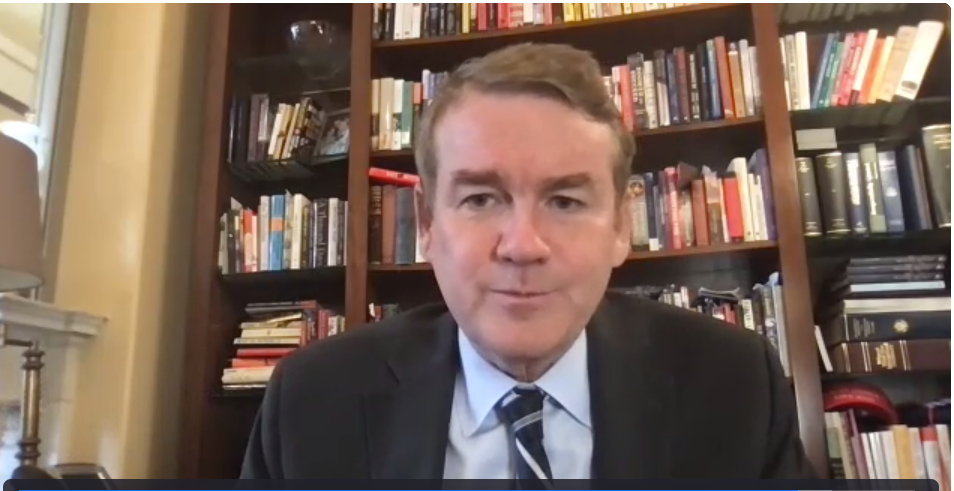Bennet, Heinrich, Castor to Congress: stand strong on funding for infrastructure for climate resiliency and green energy

WASHINGTON D.C. – Continuing to call attention to the devastating impact of drought on farmers and ranchers and the destruction to small businesses and homes caused by historic forest fires, U.S. Sen. Michael Bennet (D-CO) was joined by Sen. Martin Heinrich (D-NM) and Rep. Kathy Castor (D-FL) in strongly urging Congress to not shortchange funding in the American Jobs Plan that provides for the crucial restoration of forests, protecting watersheds, expanding clean energy infrastructure and implementing climate resiliency.
“Climate change is not a distant threat for someone in the future to deal with,” Bennet said. “It’s an immediate threat now and it’s already inflicting damage in Colorado.”
As Congress debates an infrastructure package, Bennet views this as the best opportunity in decades to make long-term investments the nation has put off for years.
“The American Jobs Plan puts out $40 billion for natural infrastructure to restore our forests and protect our watersheds. Hundreds of billions of dollars to expand clean energy infrastructure and clean energy standards to dramatically reduce carbon emissions. I could go on, but the point is that the scale [ of the funding] is important and significant,
“We can spend $1500 an acre treating acreage or $50,000 an acre fighting a fire,” Bennet said. “We’re going to spend money either way. But the way Joe Biden is proposing to spend it is smarter and much better from a fiscal perspective and from a jobs creation point of view.”
Bennet went on to urge Congress to avoid the “penny wise dollar foolish” approach that has been taken in the past and is “really excited at the prospect of negotiating the bill over the coming weeks and getting something on the floor of the Senate that we can pass, making a difference for the American people and creating the opportunity for this country to lead again.”
Senator Heinrich of New Mexico, known to be another strong advocate for addressing climate change, spoke of the situation in the west. “We are having the driest year on record in New Mexico with multiple fires burning in the state. This is the new climate reality, the new normal that we’re grappling with and we urgently need to rebuild and repair our infrastructure to reflect this costly reality. As Congress continues to address a major investment in infrastructure, we can’t afford to shortchange investments in climate resiliency and clean energy.”
Heinrich described the American Jobs Plan as a once-in-a-lifetime opportunity. “We cannot allow ourselves to get so bogged down in bad faith negotiations or accept deals that shortchange or entirely leave out meaningful climate action.”
Heinrich admitted to being frustrated with proposals put forth for consideration. “I’ve been especially frustrated that something as common sense and previously bi-partisan as high voltage transmission lines has been left out of many of the Senate Republicans’ counterproposals. The White House and Democrats in Congress need to hold strong on meaningful, bold, substantial climate provisions that President Biden proposed in his American Jobs Plan. This is the only show in town on climate, and it’s the only chance we’re going to get to demonstrate to the entire world that America is truly ready to step up and lead on climate, once again.
“Time is ticking away” Heinrich continued, “and I’ve seen this movie before in 2009. I’m going to make sure we don’t waste the greatest opportunity in a generation to truly make the steps we need to make to recognize the energy transition we’re going through and to maximize the benefits to all of us – to our families and all of our constituents.”
Rep. Kathy Castor, who represents the Tampa Bay area in Florida, brought a coastal perspective to the conversation by stating that, in the southeast, people now approach the summer months with trepidation because climate-fueled storms now threaten communities more than ever, adding that, last year, “we ran out of letters in the alphabet with a historically busy hurricane season and thirty named storms forming in the Atlantic.”
Over the past decade, Florida has experienced 22 extreme weather events that were becoming “costlier and costlier” to communities, states and the federal government. In the state of Florida alone, climate-fueled weather disasters have cost in excess of $100 billion over the last ten years.
Castor also highlighted the devastating impact of extreme heat as Florida has experienced the hottest summers in history, again, over the last decade.
“This is all affecting the routine of our daily lives, and President Biden’s Job Plan will help us address these issues instead of waiting for the next disaster to strike and then paying out millions and millions of dollars in damage. We can’t continue to do that.”
She went on to say that Biden’s Job Plan is “so smart.” “Americans are asking themselves, why does Congress tie itself into knots when the solutions are so evident?” she said.
Castor also briefly mentioned a bill that had just passed the Florida legislature prohibiting communities from setting clean energy goals. “That just shows how much power the special interest groups have in trying to make communities stay tied to fossil fuels,” she said.
Cautioning against waiting, Castor said, “The time is now. We can’t afford to wait. This is our one chance to address these issues and leave our kids a healthy planet.”
“At the end of the day, it’s about protecting our communities,” Bennet said. “It’s about taking common-sense steps to plan for the future. It’s about acting now to save lives and our communities down the road, and I think that’s the perspective they desperately need in Washington.”



